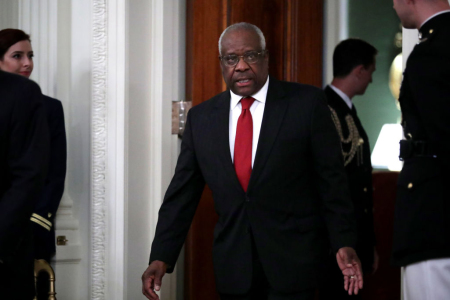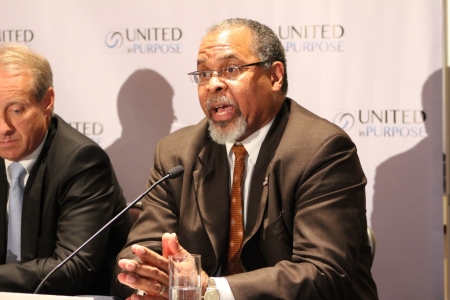Justice Thomas slams Supreme Court rejection of mail-in ballot cases: 'Erosion of voter confidence'

Justice Clarence Thomas called the U.S. Supreme Court’s refusal to hear two Pennsylvania mail-in ballot cases from the 2020 election “inexplicable” and “befuddling” as two justices appointed by President Donald Trump did not join in dissenting from the court’s decision.
Justices Thomas, Samuel Alito and Neil Gorsuch were the only justices who dissented from the Supreme Court’s decision Monday not to review cases regarding election integrity and Pennsylvania Supreme Court’s authority to extend the state’s mail-in ballot deadline three days past the Nov. 3 election.
Thomas’s 11-page dissent expressed concern for the future of election integrity and said there “is a clear split on an issue of such great importance.”
“One wonders what this Court waits for,” Thomas, one of the court’s more conservative members, wrote. “We failed to settle this dispute before the election, and thus provide clear rules. Now we again fail to provide clear rules for future elections. The decision to leave election law hidden beneath a shroud of doubt is baffling. By doing nothing, we invite further confusion and erosion of voter confidence. Our fellow citizens deserve better and expect more of us. I respectfully dissent.”
Thomas argued that although the Constitution says that it is the state legislature's job to set election policy, "nonlegislative officials in various states took it upon themselves to set the rules instead" before and after the 2020 election.
Thomas said “unclear rules threaten to undermine” the constitutional structure of elections by sowing confusion and dampening confidence in election fairness and integrity. He said though Pennsylvania’s decision to “rewrite the rules” and change the mail-in ballot deadline did not appear to alter the 2020 presidential election’s outcome, “we may not be so lucky in the future.”
He warned that future cases "will arise as lower state courts apply those precedents to justify intervening in elections and changing the rules."
Thomas cited another instance where a Pennsylvania Supreme Court decision could have altered election results for a state-level race.
“That is not a prescription for confidence,” Thomas said. “Changing the rules in the middle of the game is bad enough. Such rule changes by officials who may lack authority to do so is even worse. When those changes alter election results, they can severely damage the electoral system on which our self-dissenting governance so heavily depends. If state officials have the authority they have claimed, we need to make it clear. If not, we need to put an end to this practice now before the consequences become catastrophic.”
Justice Alito, joined by Justice Gorsuch, also dissented. They argued the cases “present an important and recurring constitutional question.”
“Now, the election is over, and there is no reason for refusing to decide the important question that these cases pose. …,” Alito wrote. “A decision would provide invaluable guidance for future elections.”
Thomas called out the Supreme Court for not taking the opportunity to address these issues before the next election cycle.
“These cases provide us with an ideal opportunity to address just what authority non-legislative officials have to set election rules, and to do so well before the next election cycle. The refusal to do so is inexplicable,” Thomas said.
Thomas’ dissent drew pushback from liberals, who argued that his dissent seemed to question the reliability of mail-in ballots and further Trump’s claims of voter fraud. Democratic National Committee Chairman Jaime Harrison argued in a tweet that Thomas’ dissent was a “radical” and “unhinged opinion.”
Sylvia Albert, the director of voting and elections at Common Cause, told USA Today that Thomas’ dissent suggests state supreme courts aren’t qualified to decide election issues.
But Ken Blackwell, a longtime conservative evangelical operative and politician who now serves as a senior fellow for human rights and constitutional governance at the Christian conservative activist group Family Research Council, argues that the concern expressed in Thomas, Alito and Gorsuch’s dissents was warranted due to the unconstitutionality and irregularity in the Pennsylvania cases.

Blackwell told The Christian Post in an interview Tuesday that the Supreme Court should have given the cases a “full and fair ” hearing. The former Ohio secretary of state and Trump transition team member expressed surprise that Justice Amy Coney Barrett, who was nominated by President Trump last year, did not join in the dissent.
Fellow Trump appointee Brett Kavanaugh also did not join in the dissent written by their conservative colleagues.
“It was disappointing,” Blackwell said. “All it took was four justices to say, ‘we will give a full erring to these disputes, these charges, these irregularities and potentially unconstitutional actions.’ By turning a blind eye and rejecting to even hear the case, they have done tremendous, if not irreparable harm to voter confidence and the integrity of future elections.”
Blackwell, a former ambassador to the United Nations Human Rights Council and former undersecretary for the Department of Housing and Urban Development, said that not addressing election concerns and the illegalities of mail-in voting now will have repercussions down the road and should be “alarming” to all Americans.
“What it does, it sets the condition and the environment for us to be revisited by these transgressions, irregularities, illegalities and unconstitutional actions by state courts and state political operatives,” Blackwell said.
Blackwell said voting in precincts is the “hallmark” of American elections. He said the continuation of unchecked mail-in voting could lead America away from a “vibrant” two-party system and toward a one-party system way of totalitarian, authoritarian and socialist governments.
Blackwell said stopping the progression of H.R. 1, Democratic-proposed legislation to centralize elections, is one way to “stop the assault on the Constitution.”





















